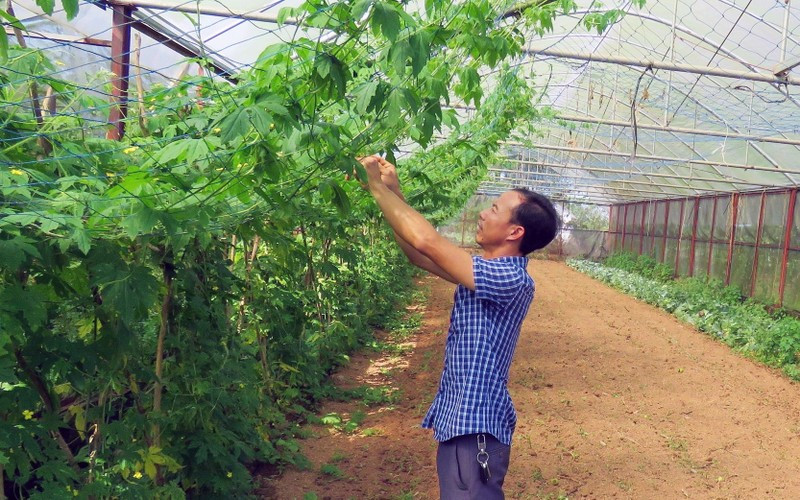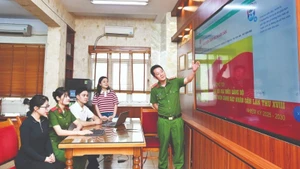Seven years ago, the people of Hoa Trach Commune, in Bo Trach District, were surprised to see that Le Thi Thanh Thuy and her husband Le Dinh Qua returned to the hills to settle down, while they had good jobs in Quy Nhon City. However, the way this engineer and his wife do agriculture is also different. They chose the hilly land full of gravel where people used to grow acacia and melaleuca, to implement an organic farming model.
The first years of starting a career in this arid land were very difficult, but they were not discouraged, because they have master’s degrees with in-depth knowledge about agriculture. At first, Qua and his wife had to spend their efforts to improve the land for growing vegetables, then the farm gradually developed following the development orientation of their organic agricultural products.
To take a steady step, this engineer and his wife established An Nong Company Limited with the brand name An Nong Farm. Holding the role of company director, Le Thi Thanh Thuy embarked on market development and product marketing, while her husband is in charge of construction and engineering for the farm, with organic farming methods, without using harmful chemicals.
In contrast, An Nong Farm uses composted manure and self-produced microbial fertilizer for crops. Although the area is not large, An Nong farm is currently developing in the direction of diverse ecology. Qua boldly experimented with many new farming methods, in line with current trends and capable of responding to natural disasters in the central region.
Next to two greenhouses, with an area of more than 1,500 square metres, are low-rolling houses with plastic covers when needed. The farm has a system of green trees such as casuarina and melaleuca surrounding it, which is responsible for blocking the wind and protecting the greenhouse and plants. Not only the cultivation of vegetables and fruits in each season but at An Nong farm, the structure of vegetables is also calculated scientifically.
Qua shared that leafy vegetables such as cabbage, cauliflower, and lettuce, often suffer from pests and diseases. Therefore, next to these vegetable beds are beds of vegetables with pungent odours such as onions, cilantro, and carrots. This alternate planting method helps to limit pests quite effectively.
From the arid gravel land, An Nong Farm has become a famous green and fertile farm in Quang Binh. An Nong organic fruit and vegetable brand is also known to consumers more and more through stores and distribution channels. Qua said An Nong Farm's goal is to build an organic production chain, and at the same time, support local farmers to develop a chain of clean agricultural products. An Nong Farm is also a pioneer in developing various types of experience services and agroecological tourism.
Also choosing organic agriculture as a sustainable direction in production, Truong Quoc Viet in Kim Hoa Commune, Tuyen Hoa District, has a famous fruit garden with an area of more than 14 hectares, including 6 hectares of oranges, 7 hectares of pomelos, several orchards and fruit trees. The rest is lemon. At the beginning of 2018, with the support of the agricultural industry, he began to experiment with organic fruit tree models.
In 2021, the first orange crop yielded nearly 20 tonnes. Although, during the COVID-19 epidemic, Viet's orange garden was bought by many traders. In this year's pomelo crop, Truong Quoc Viet was even more excited when his orange and pomelo products were VietGAP certified, with traceability stamps and QR codes. After scanning the QR code of an orange or grapefruit, the whole care process from flowering, and fruiting to harvesting, will display information for consumers to know and choose.
Grasping the trend of organic agricultural production, recently, the People's Committee of Ba Don town signed a cooperation agreement to invest in the production and consumption of organic agricultural products, along the value chain with Que Lam Group in Ho Chi Minh City.
Que Lam Group Chairman Nguyen Hong Lam said, that signing a cooperation agreement on organic farming with farmers in Quang Binh, will help people realise the importance and benefits of organic production, thereby replacing production thinking. The Group has chosen to support and cooperate in implementing each specific model, following local realities to bring about high efficiency.
According to a representative of the Department of Agriculture and Rural Development of Quang Binh Province, compared to other localities, the application of technical advances and infrastructure investment to organic agricultural production here is quite slow and encounters many difficulties, due to the direct influence of weather and natural disasters.
In addition, the difficulty of organic farming methods is that productivity, output and efficiency cannot compete with non-organic products, he noted.
Specifically, in the process of cultivating organic products, producers are only allowed to use organic fertilizers and control pests by manual measures or biological drugs, so it takes a lot of effort and is difficult to deploy on a large scale.
On the other hand, farmers in the province are familiar with traditional production methods and have not fully understood the long-term benefits, so changing farming habits cannot be done immediately, he said.
However, by boldly changing production methods, many businesses, cooperatives and farmer households in the province, have applied technological advances to implement new and effective production models. Currently, the whole province has 26 hi-tech agricultural production facilities, towards organic agriculture.
According to the Deputy Director of Quang Binh Department of Agriculture and Rural Development Tran Dinh Hiep, the success of these models is a premise for people in the province to learn and apply in production, improve economic efficiency and contribute to restructuring crops and building new countryside.
For organic agricultural production to truly develop and affirm its foothold, in addition to raising awareness in the community, Quang Binh Province needs to have specific mechanisms and policies to support and enhance the value of agricultural products from organic agriculture, along with strengthening measures to control banned substances in cultivation and animal husbandry.
Quang Binh's agricultural sector will continue to support and encourage people to replicate organic agricultural production models, to improve the value of goods and ensure the health of consumers.
















